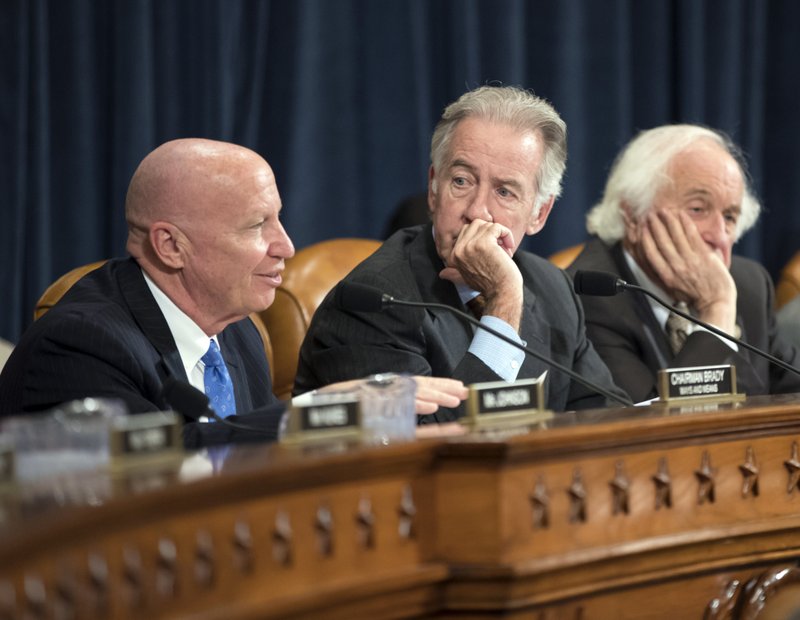
House Ways and Means Committee Chairman Kevin Brady, R-Texas, left, joined by Rep. Richard Neal, D-Mass., the ranking member, and Rep. Sander Levin, D-Mich., offers his manager’s amendment as the GOP tax bill debate enters the final stage, on Capitol Hill in Washington, Thursday, Nov. 9, 2017. (AP Photo/J. Scott Applewhite)
Congressional analysts are estimating that the Republican Senate tax bill would increase taxes in 2019 for some 13.8 million U.S. households earning less than $200,000 a year.
The nonpartisan Joint Committee on Taxation provided the analysis Monday as the Senate’s tax-writing committee begins work on its version of the tax overhaul bill. The legislation, promoted as a boon to the middle class, would steeply cut corporate taxes, double the standard deduction, and limit or repeal completely the federal deduction for state and local property and income taxes.
The analysis of the Senate plan says 13.8 million households, or about 10 percent of all taxpayers, would face a tax increase of $100 to $500 in 2019. There also would be increases greater than $500 for a number of taxpayers, especially those with incomes between $75,000 and $200,000. By 2025, 21.4 million households would have tax increases.
President Donald Trump is calling on Republican lawmakers to get more aggressive with their tax proposals.
In a tweet Monday, Trump says the GOP should repeal “the unfair & highly unpopular” individual mandate in the Affordable Care Act as part of the tax legislation, and to reduce taxes “even further.”
Trump tweets: “Cut top rate to 35% w/all of the rest going to middle income cuts?”
Neither the House or Senate tax bills includes a repeal of the individual mandate, with lawmakers saying it would make their signature legislative promise all the more difficult to approve. Both versions of the tax plan cut the top individual rate, but the Senate version only lowers it to 38.5 percent.
The chairman of the House’s tax-writing committee is expressing confidence that his chamber won’t go along with the Senate’s proposal to eliminate the deduction for property taxes.
The GOP is moving urgently on the first rewrite of the U.S. tax code in three decades, but key differences promise to complicate the effort.
The House bill allows homeowners to deduct up to $10,000 in property taxes while the Senate proposal eliminates the entire deduction.
The deduction is particularly important to residents in states with high property values or tax rates.
Rep. Kevin Brady, chairman of the House Ways and Means Committee, says he worked with lawmakers in those states to ensure the House bill delivers relief.
The Senate’s tax-writing committee will wade through its newly unveiled measure starting Monday.


